Frances Carter-Johnson, M.S. ’07, applied physics, and Ph.D. ’11, public policy, is used to getting questions about why she jumped from physics to public policy and explaining how, in her career path, it’s really all connected.
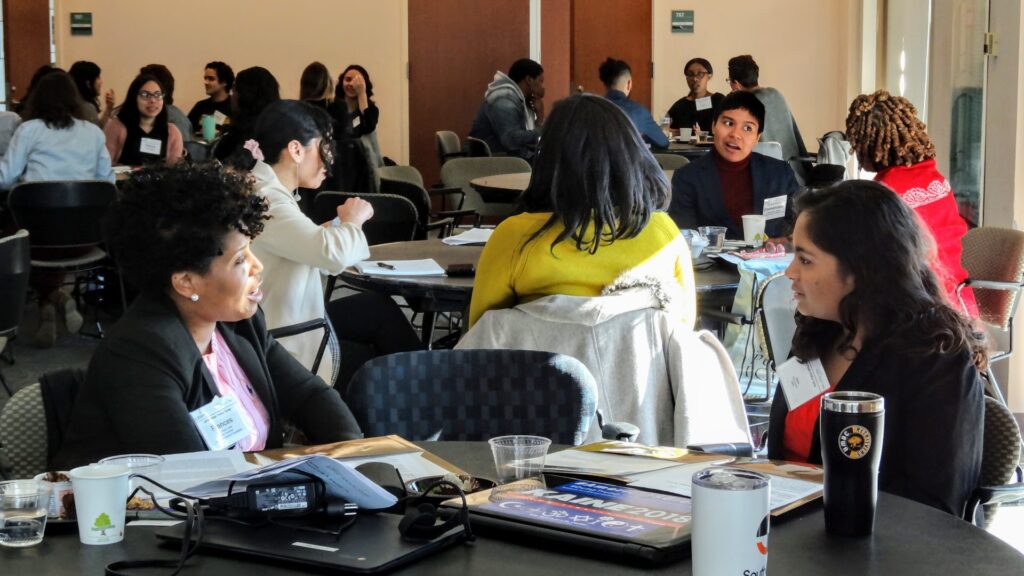 Frances-Carter (left) leads an interview and listening skills exercise.
Frances-Carter (left) leads an interview and listening skills exercise.
“I thought I was going to go to law
school but I found physics and fell in love,” says the UMBC triple
alumna. Carter-Johnson earned bachelor’s degrees in physics and
engineering, then a master’s degree in physics. “During that time, I
also realized I enjoyed working in the community,” she says. Her mentors, President Freeman Hrabowski, Associate Vice Provost Renetta Tull, and Dean Janet Rutledge,
pointed her in the direction of a Ph.D. in public policy. Today, she
combines her love of analytics, physics, and math as an education data
scientist at the National Science Foundation.
Learning from stories like Carter-Johnson’s, the UMBC School of Public Policy is working to create more opportunities for diverse students to see future careers for themselves in the field.
Reaching out
To move this work forward, the UMBC School of Public Policy is partnering with the Association of Public Policy Analysis and Management (APPAM), a national organization that fosters excellence in research, analysis, and education in public policy. On March 12, the partners hosted a day-long public policy camp to connect with undergraduate and graduate students, particularly from underrepresented groups, who may not be exposed to public policy as a field of study.
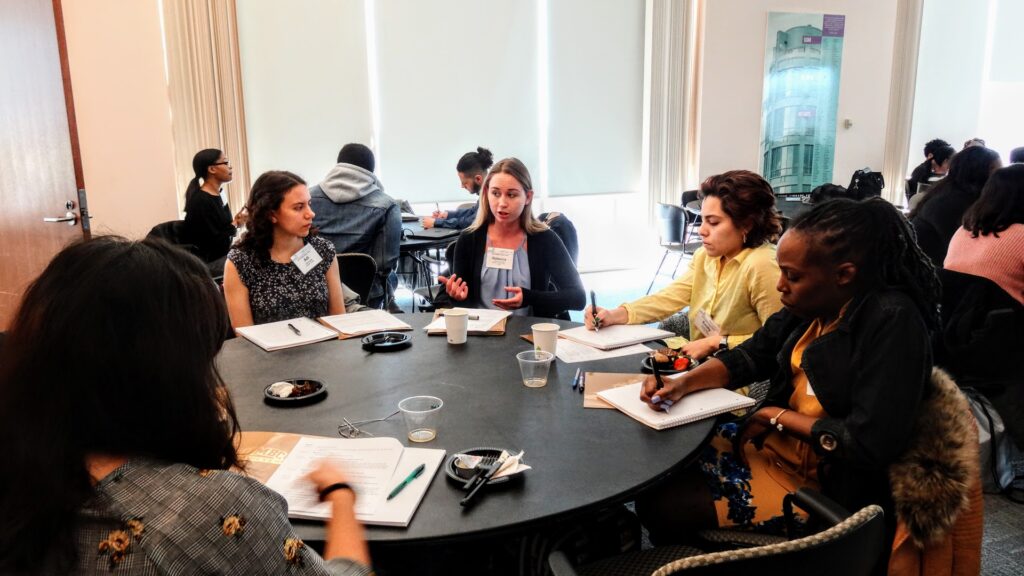 Public policy professionals and students discuss current policy issues in Baltimore City.
Public policy professionals and students discuss current policy issues in Baltimore City.
Susan Sterett, director of the School of Public Policy, and Jane Lincove,
associate professor of public policy, envisioned the event and proposed
it to APPAM. Their goal was to draw diverse students from across UMBC
and the broader mid-Atlantic region.
“We felt that UMBC was uniquely positioned to meet APPAM’s goals in helping to diversify the field because of UMBC’s strong, diverse student scholars, many of whom are first-generation or come from underrepresented groups,” shares Lincove. UMBC’s proximity to Washington D.C., Pennsylvania, Virginia, and New York also provided an opportunity to connect with a large number of students about professional possibilities that exist in the field.
Sterett and Lincove worked with UMBC’s College of Engineering and Information Technology and the College of Natural and Mathematical Sciences to reach students usually not exposed to public policy. They also drew participants from other University System of Maryland schools, area HBCUs, local community colleges, and additional private universities, such as Johns Hopkins, Temple, American, Virginia Commonwealth, and Columbia.
Alumni share their perspectives
Several public policy alumni, as well as faculty and current doctoral public policy students, participated in the event, to share how they have applied their skills in the field in a broad range of ways. They shared their experiences through both small group conversations and a panel discussion.
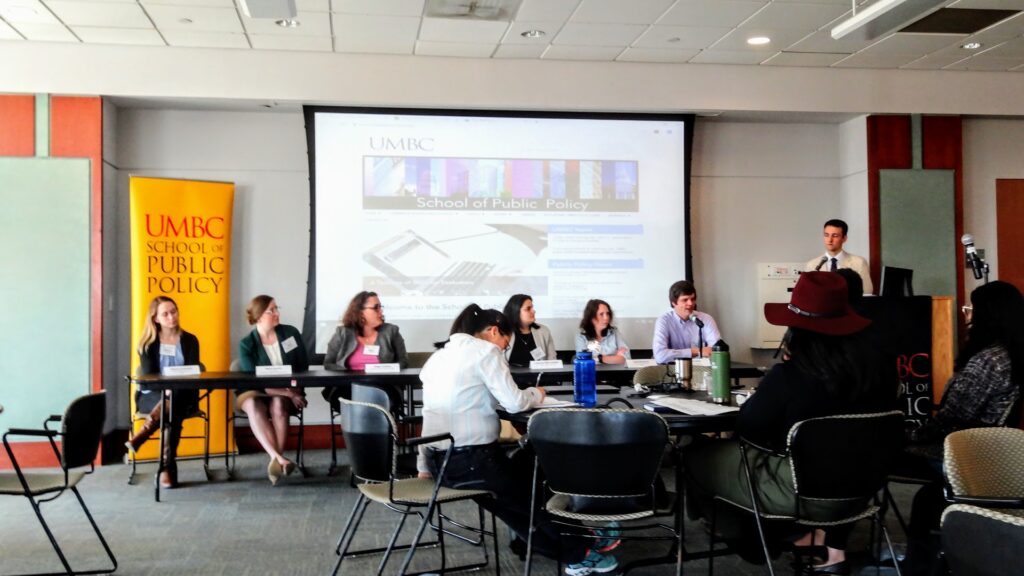 Chris Curran (right), assistant professor of public policy, introduces the panel.
Chris Curran (right), assistant professor of public policy, introduces the panel.
Understanding the practical value of a diverse team was an important message for Steve Sharkey, M.P.P. ’06, public policy, who serves as director of Baltimore’s Department of General Services.
“We need more women and people of different races [in the policy
field]. That is the future,” explained Sharkey. “Different perspectives
are important for creating policy and to understanding community
impact.”
Other participants focused on the need to develop policy through a more holistic, systems approach. This approach allows Margarita Cardona, a UMBC doctoral student in education policy, to implement rules and regulations for research with human subjects in her work as assistant provost of sponsored research at the University of Baltimore. “I manage a review board that depends on implementing policy to ensure the best practices in research,” explains Cardona. “Having real-world conversations about policy-driven solutions to community problems helps demystify what public policy is and can do.”
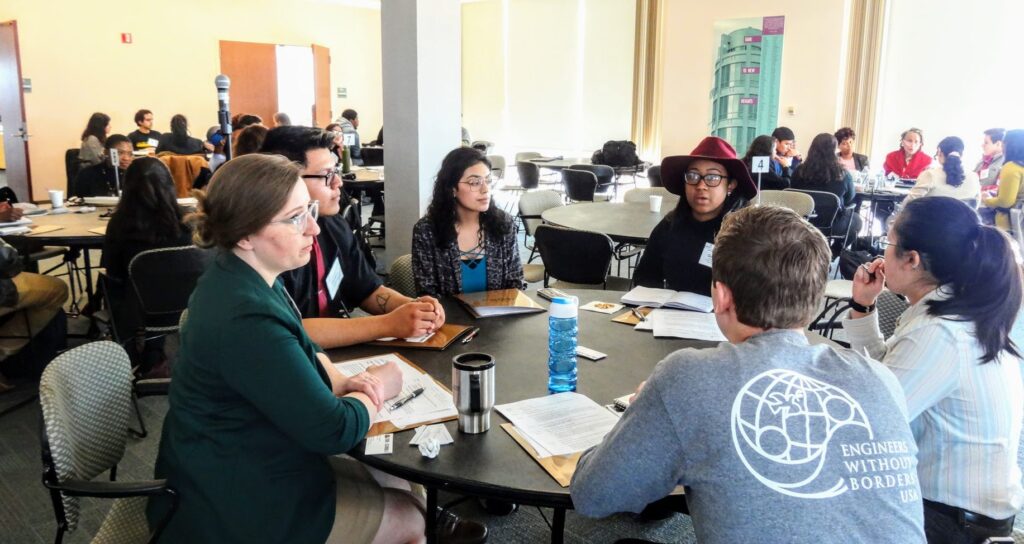 Qubilah Huddleston (in red hat) discusses what defines public policy.
Qubilah Huddleston (in red hat) discusses what defines public policy.
Qubilah Huddleston, M.P.P. ’17, education policy, a program
manager for Code in the Schools, agrees. Huddleston is avid about
sharing the realities of policy implementation at the local level.
“There are only four Baltimore City schools that provide computer
science education,” she explains. “Managing a program that fills that
need means understanding government and education policy. We have to be
intentional about making decisions for long-term positive impact.”
Hands-on learning
Throughout the day, students also focused on interactive activities led by alumni and other professionals in the field. Groups practiced foundational public policy skills like interviewing and active listening. They also practiced conducting research and implementing policy on two current Baltimore City issues: food deserts and lack of reliable heating in public schools. The second half of the camp focused on an interactive game to understand budget and fiscal policy.
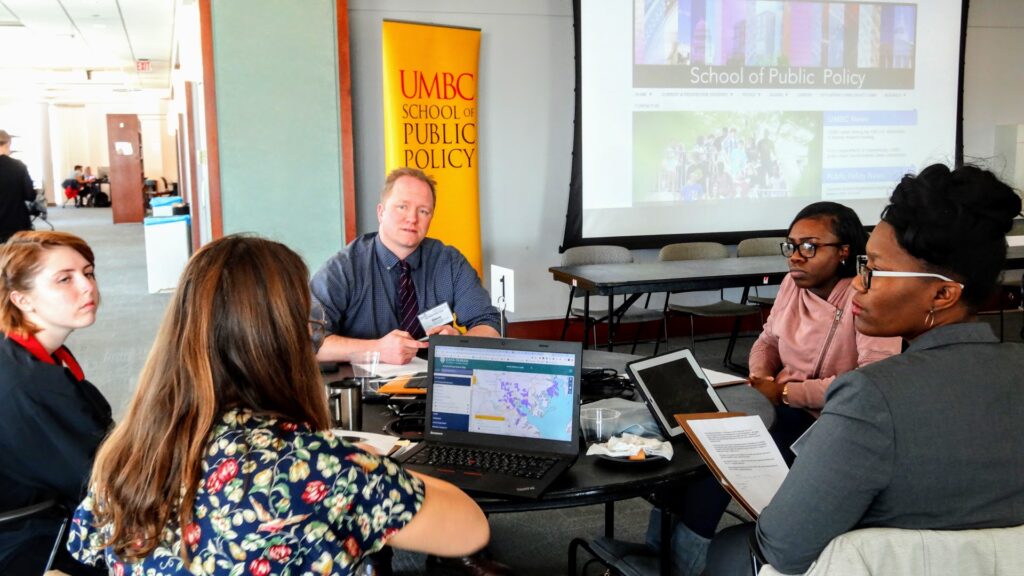 Sharkey listens to students have policy debates over Baltimore City food deserts.
Sharkey listens to students have policy debates over Baltimore City food deserts.
Incoming freshman Shriya Samala
‘23, who has been interested in public policy and political science,
appreciated the opportunity to network with professionals and peers who
are in different stages of their journey. She compared notes with
Emmanuel Caintic, a CCBC student interested in constitutional law, and Daniel Kozlowski
‘19, mechanical engineering and a Sondheim Public Affairs Scholar, who,
like Carter-Johnson, is combining his love of a STEM field with public
service. Together, they were excited about the many future paths open to
them in public policy.
“The public policy camp was a great opportunity to meet UMBC’s public policy faculty and professionals in different areas,” explains Samala. “I have been working in local politics in Virginia throughout high school. I want to run for office someday,” she says. “Today was a step towards meeting my goal.”
Banner image: Amanda Latimore (left), assistant scientist at Johns Hopkins Bloomberg School of Public Health, leads a table discussion with students. All photos courtesy of UMBC’s School of Public Policy.